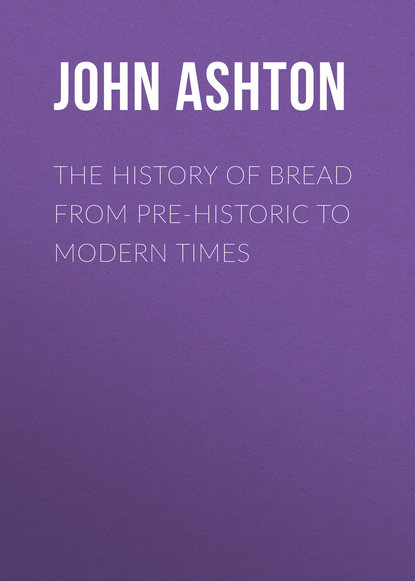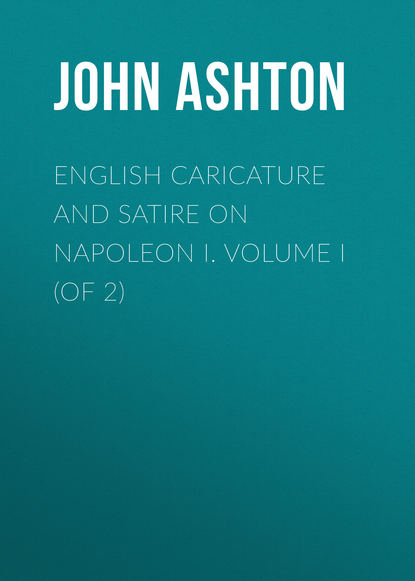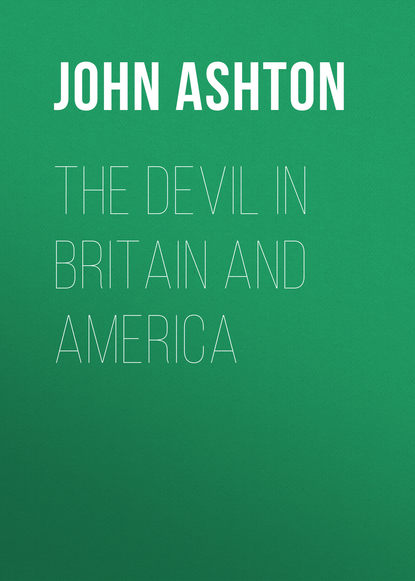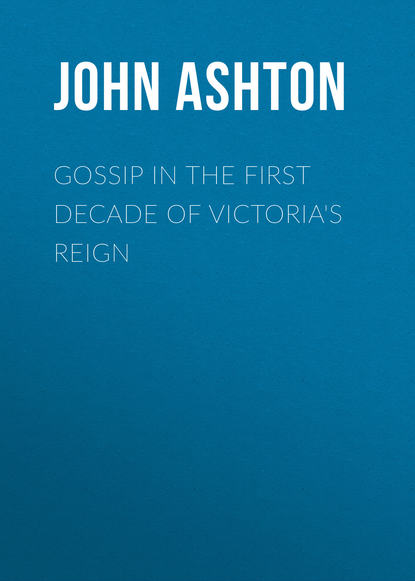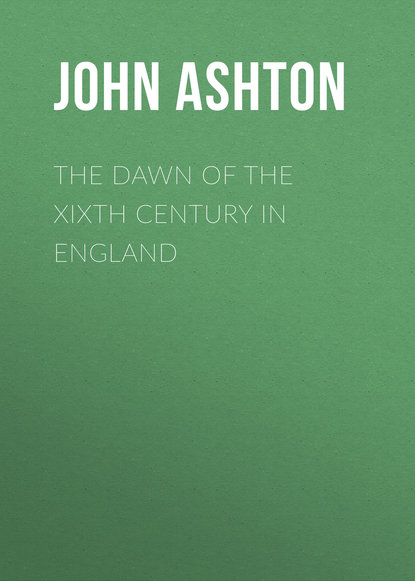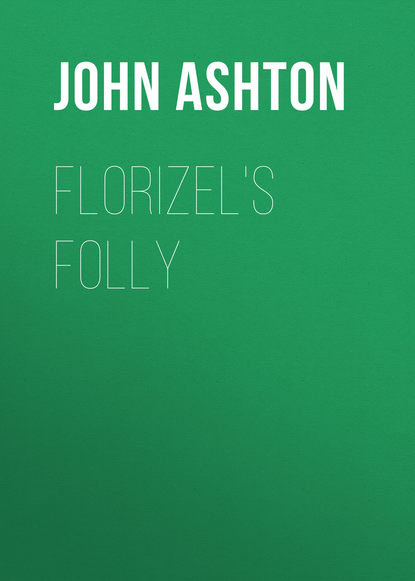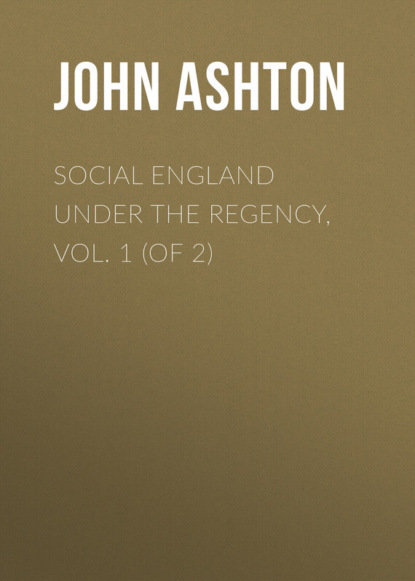
Полная версия
Social England under the Regency, Vol. 1 (of 2)

John Ashton
Social England under the Regency, Vol. 1 (of 2)
Certainly, it is not the least part of an Author's reward, for all his pains and trouble, to find that the Public appreciates his efforts, and purchases, and reads his books.
This, I am happy to say, was specially the case with one of mine, "The Dawn of the Nineteenth Century." In it I wrote of Social England in the first decade of the century, leaving off at a time when George III. was hopelessly incompetent to govern, and a Regency was in progress of establishment.
The favour which the Public bestowed upon this book emboldens me to continue it, and sketch the men and manners of the Regency. Most books of this class deal mainly with the great ones of the land, but I have only done so where necessary to illustrate the history of the times, my aim being more to delineate the social condition of England, and her people; and this work will be found perfectly reliable as history, nothing being taken at second hand, but all compiled, even down to the illustrations, from original and contemporaneous authorities.
JOHN ASHTON.CHAPTER I
The King's Malady – Former preparations for a Regency – King's recovery – The King at home – His love of music – Severe frost – Lucien Buonaparte a prisoner of war – French obstructions to commerce – A gallant merchantman"State of His Majesty's Health"Windsor Castle, January 1, 1811.
"His Majesty has passed a quiet night, without much sleep, and continues the same as he was yesterday.
"H. Halford."W. Heberden."R. Willis."Such was the announcement contained in The Times of 2nd of January, 1811, and, for some time, the subjects of George III. were fed with daily news of the King's health. By and by, as his mental disease was confirmed, they grew fewer, until they were furnished just once a month, and then only the very scantiest intelligence of his condition was vouchsafed to his people.
This was not the first time that his mind had given way. In the early part of October, 1788, he had decided symptoms of mental aberration, and was totally incapable of undertaking any of the affairs of State; but his physicians were hopeful of his recovery – and their hopes were gratified. But the Ministry thought differently, and, after suggesting that the Government should be carried on by a Commission, on the 30th of December, 1788, Pitt wrote a letter to the Prince of Wales, stating that his Majesty's Ministers had come to the conclusion to offer him the Regency of the kingdom under certain restrictions.
The Prince of Wales replied at once, expressing his sorrow at the occasion of his proposed elevation, but accepting the trust. Of course, this suggestion of the Government could not be acted upon without mature deliberation, and it was not until the 30th of January, 1789, that the following resolutions of the Lords and Commons were presented to the Prince of Wales – "That his Royal Highness be empowered to exercise the royal authority under the title of Regent." "That the power given, should not extend to the granting of any peerage, except to the Royal issue." "Nor to the grant of any office in reversion, or any office, salary, or pension, than during his Majesty's pleasure; or to the granting his Majesty's real or personal estates." "That the Care of his Majesty be committed to the Queen, who should nominate all persons to the offices in the household."
Needless to say, the Prince made no objections, and by the 12th of February, the Regency Bill had gone through all its stages in the House of Commons, and was ordered to be sent to the Lords. But the proverbial "slip 'twixt cup and lip" occurred. On the 19th of February the Lord Chancellor informed the House of Lords that, according to the report of his physicians, the King's health was steadily mending, and they therefore abstained from further consideration of the Regency Bill.
The physicians' hopes were fully justified; the King got better rapidly, and, on the 27th of February, his perfect recovery was announced, the prayer for the same was discontinued, and a form of prayer of thanksgiving for his restoration to health, was ordered to be read in all Churches and Chapels throughout England and Wales. Rejoicings and illuminations were the order of the day, and, on the 23rd of April, the day of general thanksgiving, the King, Queen, and Royal family went in state to St. Paul's Cathedral, to return thanks to God for his mercy in giving the King his reason and health once more.
Years went on, and the King did not suffer from mental disease, until the year 1810, when to bodily illness of his own, was added the death of his daughter, the Princess Amelia. This shock, his intellect, perhaps never too strong, could not stand, and, although his condition was concealed for some little time from the people – under the pretence that he had a cold – the truth was obliged to come out; and we read in The Morning Post of October 31st – "It is with heartfelt sorrow we announce that His Majesty's indisposition still continues. It commenced with the effect produced upon his tender parental feelings on receiving the ring1 from the hand of his afflicted beloved daughter, the affecting inscription upon which, caused him, blessed, and most amiable of men, to burst into tears, with the most heart-touching lamentations on the present state, and approaching dissolution of the afflicted and interesting Princess. His Majesty is attended by Drs. Halford, Heberden, and Baillie, who issue daily bulletins of the state of the virtuous and revered monarch, for whose speedy recovery the prayers of all good men will not fail to be offered up."
This time the Physicians held out no hopes of the King's recovery, or if they did, it was at some vague, indefinite future, the date of which none could prognosticate, and Parliament found itself in a serious situation. It met on the 1st of November, to which date it had been prorogued, only to find that there was no King to open the session, and no Commission for so doing had been named. So, in default of any other recognized authority, the Lord Chancellor, and the Speaker, took the lead in their different assemblies, and, after vainly trying to find out how they should act, an Order in Council cut the Gordian Knot, adjourning Parliament to the 29th of November, a decision which was confirmed in the House of Commons by a majority of 285. When they again met, they, after discoursing of the King, set to work to concoct a Regency.
But that may wait for a while, and come in its proper place, for King George is passing away from this history, and the full blaze of the Regency leaves very little room for the shadow of the old King to show: yet, before he disappears altogether, it may be as well if we can recall a reminiscence of him, as late as possible, before his sad malady overtook, and mastered him. Not in his public capacity, but as it were en famille, let us see him; and we get a good view of him through the medium of the Rev. John Evans, LL.D., of Islington, who wrote "An excursion to Windsor," and thus describes what he saw on the 10th of July, 1810: —
"We entered Windsor about six o'clock, and, having refreshed ourselves at the inn with a cup of tea, hastened to The Terrace, where we found a considerable portion of genteel company. Intent on the gratification of a laudable curiosity, we felt peculiarly happy in joining them on this occasion. It was seven o'clock, and the good old King soon made his appearance with his accustomed punctuality.
"A little door in the Castle was thrown open, when two attendants were seen leading this venerable personage with great care down a flight of steps till he safely alighted upon the terrace. Then the Princesses Elizabeth and Augusta, who were present, accompanied him, one on each side, or rather took hold of his arm; they paced backwards and forwards for an hour, two bands of music playing alternately; and the fine tones of the several instruments being heightened by the stillness of the closing day.
"The King was dressed neatly: blue coat with gilt buttons and blue star, white waistcoat and small clothes, white stockings, and gold buckles in his shoes. His hat somewhat resembled that worn by the clergy, with the addition of a gold button and loop, mounted by a black cockade, which marks him out conspicuously from the rest of the company. His Majesty looked ruddy and full; his voice is sonorous, and he converses with cheerfulness, though, when he attempts to speak rather hastily, it is with hesitation.
"His want of sight is very apparent, for his hat is drawn over the upper part of his face, and he feels about with his cane, especially ascending or descending a step. It is affecting to see him, though he appears cheerful when he speaks, and seems as if nothing were the matter with him. He now and then stops to converse either with the officers, or with the nobility and gentry. We saw him several times on the Terrace; but on this first evening there was a more than ordinary degree of conversation. He was full of inquiries respecting the installation of Lord Grenville as Chancellor of the University of Oxford, which had taken place during the week. He inquired also about the balloon in which Mr. Sadler2 had ascended on this occasion, and was particularly anxious to know how long it continued in the air, and where it had alighted; Harrow-on-the-Hill was mentioned, though the spot had not then been ascertained. He conversed at all times on a variety of topics with the utmost freedom and even hilarity.
"This daily promenade must benefit both his mind and body: while the presence, as well as the attention, of so many of his subjects, some coming from distant parts, must yield him no inconsiderable gratification. The countenances of the Princesses are replete with good nature, and most exemplary is their attention to their aged parent…
"It should be mentioned that the King, in returning back to his apartments in the Castle, passing by the band of musicians on the steps, always touched his hat, and said, in an audible voice, 'Gentlemen, good night, I thank you.' Indeed, his Majesty, during the whole time, seemed in perfect good humour with all the company.
"The only etiquette observed on the Terrace is, that when the King passes, the ladies and gentlemen withdraw on either side, the latter merely uncovering the head; bows and curtsies being dispensed with on the occasion. A police officer is in attendance, who, with a little switch, keeps individuals from pressing too much on the King, when he stops to converse; but this is done with the greatest urbanity. Owing to a slight indisposition, the Queen did not make her appearance on the Terrace; but we saw her on other occasions. His Majesty was regular in his attendance at Chapel every morning, and seemed seriously engaged in his devotions.
"About ten o'clock, when the weather is fine (Sundays excepted), the King rides out on horseback; and, considering his age, he mounted his horse with wonderful agility. He is, in his ride, accompanied by two of the Princesses, who have some of their maids of honour following in a landau or phaeton. The King has several attendants, two of whom are close by him, and one has a little stick, the crooked end of which catches that part of the bridle nearest the curb, so that should the animal, on which his Majesty rides, stumble, instant assistance might be given."
Music was his greatest solace from his latter seizure till his death, and we learn of him in the beginning of the year 1811 (Morning Chronicle, Jan. 8th): —
"Windsor, January 6th, – The Bulletin of to-day is of a very cheering nature, and for these five days past his Majesty has been gradually improving, both in mental and bodily strength. His Majesty has become more tranquillized in his general deportment, and there are daily visible signs that his malady is on the decline. His Majesty now uses the sitting-room in the Blenheim Tower; takes his meals regularly, and at intervals amuses himself with playing the most familiar tunes on the harpsichord, with a correctness surpassing the most sanguine expectations. As a striking proof of this fact, on some very recent occasions, when his Majesty, in consequence of his defective sight, struck a wrong key, he instantly corrected the error by modulating the tune, and finishing it with his accustomed science and judgment…
"The Harpsichord on which his Majesty plays, formerly belonged to the great Handel, and is supposed to have been manufactured at Antwerp in the year 1612. Handel's music is highly esteemed by his Majesty, and many of his most favourite compositions are now played by his Majesty from recollection." And so let us leave him, for a while, to be soothed by his music.
The year 1811 came in bitterly cold, and sad were the tales told in consequence. As to the Coaches, they suffered severely. On the 4th of January the fall of snow was so great, that the Northern roads were all but impassable, and the Mail Coach from Boston could only be dragged four miles through the snow, the guard having to do the best he could, on horseback, with the mails, and the mails from London to Boston had to be conveyed in the same manner. The Leicester Coach, on the way to Stamford, was upset in the snow at Burton-Lazarus, and several of the passengers were hurt; the Carlisle Mail was dug out of the snow at Tickencote, and with difficulty got to Stamford with eight horses, three hours later than usual; but it could not proceed further than Thornhaugh, whence the guard was obliged to take the letter-bags on horseback. Three coaches from the north lay all night in the snow about a mile from Stamford, and as many near Winsford. Oh! for the good old Coaching days! when Pulman's Cars were unknown, and people with slender purses had to ride outside in all weathers – and it was recorded that on the 5th of January, 1811, on the arrival of the Carlisle Coach in London two poor women, outside passengers, were frozen to death. The Coachman supposed them to be asleep, and did not attempt to disturb them until he arrived at his destination, when they were found stiff in death. Two persons near Lincoln perished in the snow, and the cold was so great, even so far south as London, that the Thames was nearly frozen over.
Tender hearts felt for the Poor Debtors, and those in Ludgate record their thanks to M. A. Taylor, Esq., M.P., for his annual benevolent gift of two Chaldrons of Coals, 158 lbs. Beef, and 23 half-peck loaves; and to Alderman Wood, the friend of Queen Caroline, for his present of £5; and an unknown donor for 40 lbs. Beef. The poor debtors in Newgate had very many large sums to acknowledge, and were duly grateful for the kindly and thoughtful assistance thus rendered them. Sad, however, is it to find that during the Severe Frost, on the 7th of January, a poor prisoner died of Cold and Want in the Marshalsea prison. At this time we learn there were about 320 debtors in Newgate alone; and those that were without private means, had to subsist on the prison allowance of 2d. worth of bread (the quartern loaf being, in January, 1s. 3d.), so that their relief during the inclement winter, was a work of necessity, as well as of benevolence.
In 1811 was living amongst us an illustrious Prisoner of War, no less than Lucien Buonaparte, Prince de Canino (his son, Prince Louis Lucien still lives at Norfolk Terrace, Bayswater), who, not altogether falling in with his brother's policy, was on his way to the United States, when, on the 1st of August, 1810, he was taken and made prisoner by a British Cruiser. After some detention at Malta, he was sent on to England, and Ludlow was assigned as his place of detention; and there he lived for some time, inhabiting Dinham House, the seat of the Earl of Powis. He seems to have accepted the inevitable cheerfully, according to The Times of Friday, January 4th: —
"Lucien Buonaparte arrived at Ludlow about 4 o'clock on the evening of Wednesday, sen'night, accompanied by his nephew, an interpreter, secretary, Mr. Mackenzie, and a few servants. He drove to the Angel Inn where he dined and slept. On Thursday morning he walked about the town, viewed the Castle, and some of the principal streets; but, as the weather was rather unfavourable, and public curiosity great, he did not stay out long. On that evening, one of the Winter Dancing Assemblies took place, which Lucien, his nephew, and some of his friends attended. Some of the latter danced, but Lucien did not. He continued in the room till supper was announced; he then attended Countess Powis to the supper rooms, and sat at her Ladyship's right hand during supper: after which he returned to the ball and card rooms. On Saturday he went to Stone-house, a seat of Lord Powis, about five miles from Ludlow, where Lucien is in future to reside, and from thence proceeded to Walcot, the principal residence of his Lordship, where he stayed a day or two, and returned to Ludlow."
The next day's Times says: "Madame Lucien Buonaparte, with her family, and a numerous train of servants, occupying, in all, four carriages, arrived at Ludlow on Wednesday; having performed the journey from Plymouth, in a week. Lucien removed, on the preceding day, from the Inn to Lord Powis's residence in that town, called Dinham-house; his Lordship's seat in the neighbourhood (Stone-house) being found too small for the reception of so numerous a suite."
In another Newspaper the ladies are described with almost American frankness: "Madame Buonaparte is extremely handsome and fascinating; Lucien's daughter, of whom so much has been said, has great claims to a genteel figure, and elegant demeanour, but she is not beautiful. The motto on Lucien's carriage is an extraordinary one, Luceo, non uro, 'I shine without burning,'" On this motto the following Epigram was made: —
"A Wag, requested to translateThe Motto, on the Coach of StateThat sets all Wales into a wonder.'It means,' said he, and scratcht his pole,'It means I shine, with what I stole;My foolish brother burns his plunder."He afterwards, bought the estate of Thorngrove, near Worcester, and there lived until the restoration in 1814, when he went to Rome.
Some explanation is needed, to elucidate the last line of the above epigram. Napoleon was determined to do the utmost damage to England, and endeavoured to injure her in her most vulnerable part, her commerce – so, whenever the goods of Great Britain, or her Colonies, were found, they were burnt. That this was not an idle threat is shown by the following excerpts from The Times of January 7th and 8th: —
"A Gentleman who has arrived within these three days from the Continent, and has been present at several burnings of British manufactures, informs us that in every place where the decrees to that effect were put in force, it was done at the point of the bayonet: French Soldiers being always present to prevent tumults and disorder, which, on such occasions, manifested themselves everywhere."
"At the beginning of December, a number of French Officers of the Customs, with a detachment of the 17th regiment of Infantry, arrived at Brandenburg, to make searches for Colonial produce, which they immediately began with great strictness."
"Parma, December 12th. Yesterday, there were burnt in this town 24 bales of spun cotton, 150 pieces of cotton handkerchiefs, and 74 pieces of stuffs of the same manufacture; the whole being English manufactures, and seized by the Custom House agents on the frontiers of the department of the Po."
But, at sea, sometimes a Merchantman could look after its cargo itself, without need of the strong arm of a Convoy, as in the case of the good ship Cumberland, Barrett, master, bound from Quebec to England. On the 13th of January, 1811, she arrived in the Downs under a jury foremast and bowsprit, having lost both foremast and bowsprit in a heavy gale of wind off the banks of Newfoundland.
This, one would have thought, would have been sufficient excitement for one voyage, but no! when close home, between Deal and Folkestone, about seven and eight in the morning, she was attacked by four French lugger privateers, who approached under the pretence of knowing whether Captain Barrett wanted a pilot. But he was wary, and replied in the negative, whereupon the privateers declared themselves in their true colours, and poured in a volley of musketry.
Captain Barrett ordered his men down below, arming them with boarding pikes, and as soon as about twenty of the enemy were aboard, his crew attacked them, and cleared the decks, killing most of them; the others jumping overboard. Five times were they boarded, (the Frenchmen ceasing firing, for fear of hurting their own men), and five times the enemy experienced a crushing defeat. Captain Barrett then discharged three of his Carronades, loaded with round shot and Canister. One shot carried away the mainmast of one of the privateers; the second, the bowsprit of another, and doubtless injured some of their men, as there was a great cry heard. This proved enough for "Mounseer," and the four luggers sheered off.
The Crew of the Cumberland was twenty-six men, and the force of the enemy was estimated at two hundred and seventy according to the statements of the prisoners taken. The loss to the Cumberland was one man killed, and the chief mate wounded; the French loss is set down as about sixty. And what think you was the reward of the gallant crew? "The Lords of the Admiralty have, as a mark of their satisfaction at the gallantry exhibited on this occasion, expressed their intention to grant to each of the crew of the Cumberland, a protection from the impress, for the space of three Years."!!!
CHAPTER II
A Regency inevitable – Prince of Wales waited on – He undertakes the Regency – French and English prisoners of war – Roman Catholic soldiers – Roughness of manners – Passing of Regency Bill – The Prince's companions – Inauguration of the Prince as Regent – Improvement in the health of the KingAll the year the Lords and Commons had been incubating a Regency, and matters were so far advanced, that on the 8th of January, the House of Commons received a message from the Lords that they had "ordered the Lord President, and the Lord Privy Seal to attend his Royal Highness the Prince of Wales with the several Resolutions agreed to by the Lords and Commons, for the purpose of supplying the defect of the personal exercise of the royal authority during his Majesty's illness, on the part of their lordships, and desired that that House would appoint a proportionate number of their members to go with them. Also that they had ordered Earl Harcourt, and Earl Morton, to attend her Majesty with the Resolution and Address agreed to by the Lords and Commons respecting the care of his Majesty's royal person, and the direction of such part of his Majesty's household as may be requisite for the comfort of his Majesty, and for the maintenance of the Royal dignity; and desired that the House would appoint a proportionate number of their members to go with them."
The Commons chose, as under, to go with the Lords to wait upon the Prince of Wales: – The Chancellor of the Exchequer (the Right Hon. Spencer Perceval), the Secretary of State for the Home Department (the Right Hon. Richard Ryder), the President of the Board of Control for the affairs of India (the Right Hon. Robert Saunders Dundas, afterwards Lord Melville), and Sir William Grant, the Master of the Rolls; whilst the members chosen to wait upon the Queen were Lord John Thynne, Lord Palmerston (Secretary at War), Lord Clive and Colonel Desbrowe.
On the 11th of January these two deputations went in great state, the one to the Prince, the other to the Queen. The Prince received them in the grand drawing room of Carlton House, standing with his Chancellor, William Adam, Esq., and Earl Moira on his right hand, the Duke of Cumberland and Mr. Sheridan on his left; whilst behind him were four Officers of his household, Mr. Tyrwhitt, Colonel M'Mahon, General Bloomfield, and General Turner.
The Lord President, as chief of the deputation, then read a paper, informing the Prince that "they were a Committee appointed to attend his Royal Highness with the resolutions which had been agreed to by the Lords and Commons, for the purpose of supplying the defect of the personal exercise of the royal authority, during his Majesty's illness, by empowering his Royal Highness to exercise that authority in the name and on the behalf of his Majesty, subject to such limitations and restrictions as shall be provided.



